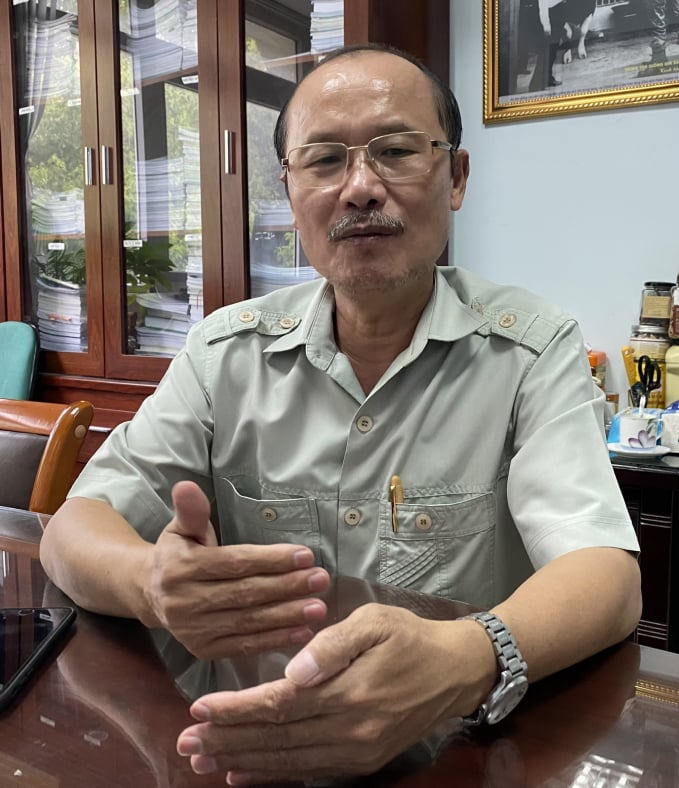November 22, 2025 | 15:34 GMT +7
November 22, 2025 | 15:34 GMT +7
Hotline: 0913.378.918
November 22, 2025 | 15:34 GMT +7
Hotline: 0913.378.918

Deputy Director of the Department of Livestock Production Nguyen Van Trong. Photo: Nguyen Huan.
In the context of violent fluctuations in domestic animal feed prices, Deputy Director of the Department of Livestock Production Nguyen Van Trong proposed to include this item in the national price stabilization programme.
According to Trong, the cost of raw materials accounts for about 80-85% and other costs such as fuel, depreciation, labor, loan interest, salary, etc. . account for about 10-15% of the production cost of animal feed. In the livestock industry, the cost of feed accounts for 65-70% of the price.
Trong said that the Department of Livestock Production and the Ministry of Agriculture and Rural Development have proposed to include animal feed into the price stabilization programme since 2018 because Vietnam is largely dependent on imported materials.
However, the outbreaks of the Covid-19 pandemic has disrupted the global production chain, continuing to reveal weaknesses in the raw material stage of the domestic livestock industry.
The Deputy Director Trong added that the market economy always has two sides so it still needs to be regulated by the State.
For example, in the context of the current high price of animal feed, if farmers produce in a chain from breeding pigs to meat, the cost of raising pigs ranges from VND53,000 to 54,000 per kilo and the current price is over VND60,000 per kilo. In such cases, the farmers could still earn profit.
However, if breeding establishments have to buy breeding pigs from outside sources for VND 2.5 - 3 million per pig, the price will immediately increase to VND67,000 - 69,000/kg.
“That's why the Department of Livestock Production always recommends farmers to produce in chains because only chain production can save input to lower production costs. Chain production also helps to proactively and flexibly control supply and demand and plan for production and consumption," Trong emphasized.
Also according to him, livestock production in Vietnam is still largely conducted by households so the industry's development strategy in the coming time is to increase farm and large-scale production but still maintain household farming, traditional animal husbandry and organic farming.
However, livestock farming households that want to continue to develop must be linked together into a chain. The first is the horizontal link in which each household is linked into a cooperative group, cooperative, group and branch. At the same time, stages are linked together and finally production and consumption are linked vertically, which enables initiative in each stage and benefits between stages. Business should be the focus in the vertical chain.
Regarding the immediate solution to adapt to the continued increase in the price of animal feed, Trong said that the cost of livestock must be reduced by all means.
In order to reduce costs, it is necessary to prepare carefully from the stage of breeding stock, stables setup, biological safety and disease safety. Besides, domestic raw materials should be utilised, meaning that poultry and waterfowl can partially be fed with rice while cattle could be fed with products from cultivation such as rice bran, potato, cassava or straw.
“So far, we have only been concerned about quality control of imported feed and raw materials but have not paid proper attention to domestic sources of raw materials and feed, especially domestic materials that can be used for food production.
In the future, we must pay attention to this issue, trying to take advantage of available materials, including agricultural, forestry and fishery by-products for processing into animal feed, in order to gradually reduce dependence on imported materials ", the Deputy Director noted.

(VAN) Viet Nam’s forestry sector is undergoing a comprehensive transformation, strengthening management, protection, and development efforts to maintain ecological security and drive green, sustainable growth.

(VAN) Viet Nam is accelerating efforts to digitize reservoir operations, from real-time data to hydraulic modelling.
/2025/11/21/3348-2-102623_454.jpg)
(VAN) National Assembly delegate Nguyen Thi Lan has proposed adding special mechanisms to attract human resources to the agricultural, forestry, and fishery sectors, addressing the shortage of high-quality personnel.

(VAN) Over the past two decades, the unified legal framework for water resource management has been perfected, becoming a crucial foundation for ensuring national water security.

(VAN) The land-data cleansing campaign in Dien Bien is entering its final stretch, yet weak infrastructure, limited personnel and fragmented multi-period datasets continue to create major obstacles.
/2025/11/20/0204-2-115235_496.jpg)
(VAN) Not only do carbon credits bring a great revenue source, but they also contribute to better forest protection and development. However, this potential remains largely untapped.

(VAN) Applying modern technology is helping environmental monitoring and oversight of management quality.